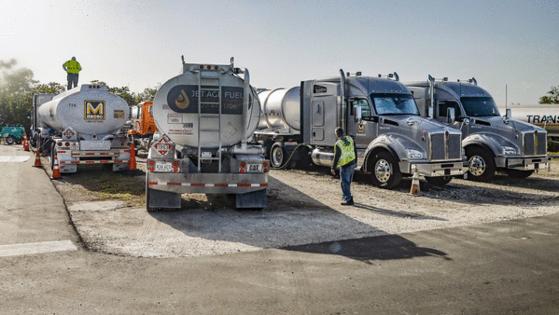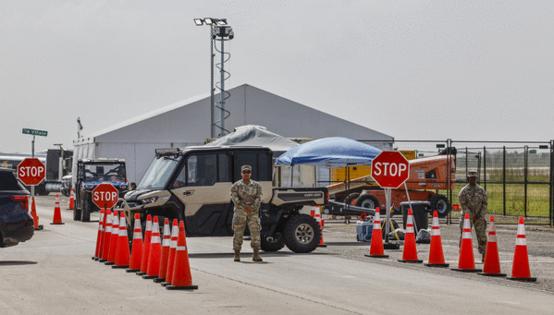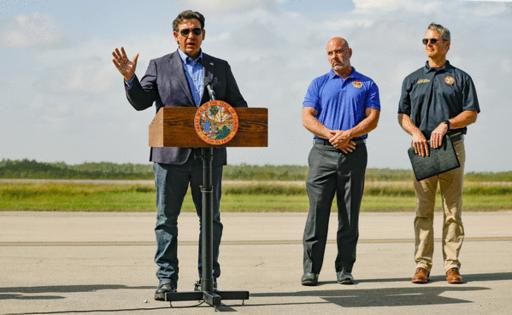Who's in charge at Alligator Alcatraz? 'We've gotten a lot of runaround'
Published in News & Features
MIAMI — Immigration attorneys and environmental activists — even the Mexican government and the Archdiocese of Miami — have all asked who’s in charge at Alligator Alcatraz.
They say they can’t get a straight answer.
“We’ve gotten a lot of runaround,” Archbishop Thomas Wenski told the Miami Herald after trying unsuccessfully to provide religious services for detainees. “We don’t know who’s really accountable for that facility, whether it’s the state of Florida or the federal government.”
Now nearly a month since Florida opened the country’s newest, most novel immigration detention center, the question of whether the state or federal government has jurisdiction over the facility — and especially its detainees — continues to puzzle legal experts, tangle up lawsuits and complicate due process for the people held there.
Attorneys say they have repeatedly been told their clients at Alligator Alcatraz are not in the custody of Immigration and Customs Enforcement, even though immigration enforcement is historically the realm of the federal government. Environmental activists suing in federal court to shut down the facility have been told the Trump administration is barely involved. Lawmakers given a tour of the detention camp said they were told it is functioning under a federal program that gives state and local officials the power to hold immigrants for the federal government — even though the state entity in charge has no such agreement.
The confusion has real-life consequences for the hundreds of men held in the detention camp’s tents and pens, and potentially broad implications for immigration enforcement under the Trump administration, which may replicate the precedent established in Florida. The Trump administration is inviting states and local governments to apply for FEMA “detention support” grants from a $608 million pool to fund the expansion of facilities to hold immigrant detainees.
“We’ve had several other states that are actually using Alligator Alcatraz as a model for how they can partner with us as well,” Homeland Security Secretary Kristi Noem said this month during a news conference in Tampa.
THE COURTS
Uncertainty around who has jurisdiction of the facility’s detainees is frustrating the Mexican government’s ability to push for the release of 14 Mexican nationals held at the site, including two brothers brought there on July 11 after being arrested by Florida Highway Patrol.
Juan Sabines, the Mexican Consul in Orlando, told the Miami Herald in a Thursday interview that the immigration attorney hired by the Mexican government to represent the brothers is still trying to find a judge who can be assigned to their cases. The Mexican government is now working to transfer them out of the detention center and to an ICE facility, he said.
“This is a prison that is not under the custody of ICE and that has no immigration judge on site,” Sabines said. “We are in limbo.”
Also complicating their cases, according to Sabines: the brothers were only assigned an Alien Registration Number — the identifier used by ICE to keep track of detainees — for the first time on Wednesday.
Sabines’ comments echoed frustrations aired more than a week ago by immigration attorneys who said they had been unable to find a court assigned to handle cases for Alligator Alcatraz detainees. The state said Friday that on-site legal services were to be available for detainees starting Monday.
MIXED MESSAGES
Federal and state officials have delivered mixed messages about who’s in charge of what.
Department of Homeland Security officials have attempted to distance themselves from the facility as a whole in court filings and deferred most questions about Alligator Alcatraz to the state. But Gov. Ron DeSantis has consistently evoked the Trump administration’s oversight of immigration detainees, saying Friday during a news conference at the facility that it is the federal government taking detainees to and from the site.
“I know DHS has a whole process of how they do it,” DeSantis said, telling reporters that the Department of Homeland Security is now running flights to and from the detention center. “Once they get on that plane, DHS handles them and processes them and deports them accordingly.”
A high-ranking Trump administration immigration official, however, said in response to a federal lawsuit by environmental groups challenging the facility’s operations that it’s the state, not ICE, that decides which detainees end up at Alligator Alcatraz.
“The ultimate decision of who to detain” at Alligator Alcatraz, wrote Thomas P. Giles, acting deputy associate director of Enforcement and Removal Operations for the Trump administration, “belongs to Florida.”
The Department of Homeland Security has said that the state is managing the facility, and that immigrants arrested under a program granting local law enforcement immigration powers are to be detained at the site. The agency did not answer questions about whether it has any kind of agreement with the state to manage the detention center, or whether detainees held there fall under federal jurisdiction.
The Florida Division of Emergency Management did not respond to questions.
Scott Hiaasen, a Coffey Burlington attorney representing the environmental groups who filed the lawsuit, said the question of who is running the detention center is crucial to the suit because it’s based on a federal statute requiring an environmental review of major federal actions.
“It shouldn’t be a mystery to either the state or federal government where the legal authority is for this place,” Hiaasen said. “What they’re trying to do, at the end of the day, is pretend like this facility is not governed by federal law.”
Beyond the bounds of 287(g)
Another representation from Giles — that the site is operating under the 287(g) program granting local and state agencies immigration-enforcement powers typically reserved for the federal government — has also confused lawmakers and immigration experts.
Scores of Florida law enforcement agencies have active 287(g) agreements, including the Florida National Guard, which has stationed guardsmen at the detention center. But the Florida Division of Emergency Management, which is tasked with running the site, is not one of them.
U.S. Rep. Debbie Wasserman Schultz, D-Fla., said Florida Emergency Management Director Kevin Guthrie told her during a tour of the site that his agency does not have the direct 287(g) authority to run the facility. She and other Democratic lawmakers said officials clarified to them many times that ICE “is calling the shots” while they toured Alligator Alcatraz on July 12.
“They (FDEM) are not designated to manage this facility on behalf of the federal government,” said Wasserman Schultz. “We were not able to get clarity on whose 287(g) authority this facility is being run.”
Jennifer Whitlock, senior policy counsel at the National Immigration Law Center, an advocacy organization for low-income immigrants, said she’s baffled by how Alligator Alcatraz came to be, if it’s not being run by ICE.
Whitlock said the state and federal governments’ statements that Alligator Alcatraz is authorized through the state’s various 287(g) agreements sound inaccurate. A 287(g) agreement permits local and state officers to hold detainees in “custody,” but it does not allow for detention without ICE oversight, Whitlock said.
Operating a state detention center, rather than holding detainees in state prisons and county jails, is stretching the 287(g) agreement beyond the bounds of what Congress intended, Whitlock said.
In the federal statute allowing 287(g) agreements, it says that any officer, employee, or political subdivision of the state is acting under the “color of Federal authority.” Also, anyone acting on behalf of a 287(g) agreement is supposed to be under the supervision of the U.S. Attorney General — which would be Pam Bondi.
“I don’t know if there is actually a plan in place for any sort of oversight,” Whitlock said.
The DeSantis and Trump administrations have been clear that Alligator Alcatraz is not a federal detention center, but have been less forthcoming about what it is under state and federal law. On the state side, officials have said that the facility is not a state correctional institution because it’s managed by the Division of Emergency Management, not the Department of Corrections. If that is the case, it’s not legally subject to the state’s standards for jails and prisons, Whitlock said.
A spokeswoman for Florida’s Division of Emergency Management did not answer questions about which laws regulate the operations and oversight of Alligator Alcatraz.
The majority of federal immigration detention centers are run through government service contracts, said Nanya Gupta, policy director at the American Immigration Council. Whether through private companies or local governments, there is typically an agreement in place for the federal government to fund the facility while another entity sets it up, staffs it and runs day to day operations.
While DeSantis has mentioned the possibility of getting refunded by the Trump administration for the facility’s cost — about $450 million a year — DHS officials have said the federal government is not currently funding any aspect of Alligator Alcatraz. Because Florida hasn’t been paid, a formal federal contract likely doesn’t exist for Alligator Alcatraz, Gupta said.
“This is the Trump administration and the state of Florida being shifty about what authority they’re invoking, when it suits them,” Gupta said. “My guess is that the only way we’ll be able to find that clarity, if at all, is through continued litigation in the federal courts.”
_____
(Miami Herald staff writers Ana Claudia Chacin and Lauren Costantino, and Miami Herald/Tampa Bay Times Tallahassee Bureau reporter Ana Ceballos contributed to this report.)
_____
©2025 Miami Herald. Visit miamiherald.com. Distributed by Tribune Content Agency, LLC.












Comments